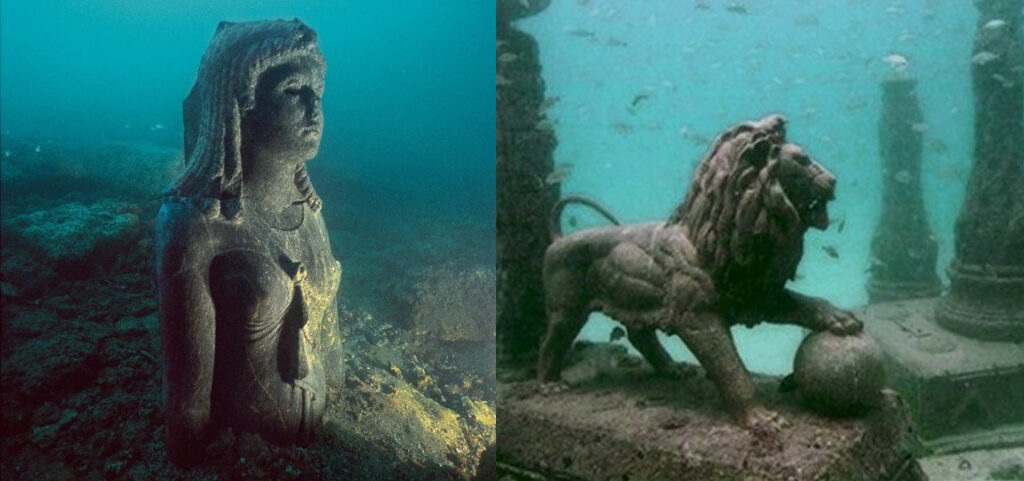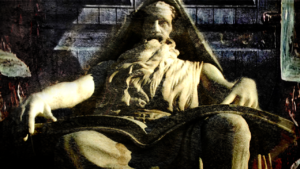The Fate of Atlantis According to Solon

“Plato, ambitious to elaborate and adorn the subject of the lost Atlantis, as if it were the soil of a fair estate unoccupied, but appropriately his by virtue of some kinship with Solon, began the work by laying out great porches, enclosures, and courtyards, such as no story, tale, or poesy ever had before. But he was late in beginning, and ended his life before his work. Therefore the greater our delight in what he actually wrote, the greater is our distress in view of what he left undone. For as the Olympieium in the city of Athens, so the tale of the lost Atlantis in the wisdom of Plato is the only one among many beautiful works to remain unfinished.”
– Plutarch, Parallel Lives Solon
As most people know, Atlantis was a large island in the Atlantic Ocean which lay at the mouth of the pillars of Heracles (straits of Gibraltar). Contrary to the concept in most people’s minds of a small and solitary island, Atlantis was said to be the size of Libya. In addition to this, the Kings of Atlantis were a confederation whose power extended over North Africa as far as Egypt and over Europe as far as Tuscany. They were a world empire.
According to Plato the Ten Kings of Atlantis were from the brood of Poseidon and Cleito, consisting of five sets of male twins, counting ten all told. Atlas was the eldest and governed the others (Atlantis is named after him) but each twin was put in control of their own territory. Plato gives the names of these progenitor kings as: Atlas, Gaderios, Amphere, Euaimon, Mneseos, Autochthon, Elasippos, Mestor, Azaes, and Diaprepres. These kings met every fifth and sixth year. Plato explains this as a way of honouring odd and even numbers.
The people of Atlantis were said to be immensely wealthy, having most needs in endless abundance: minerals, timber, animals (including elephants) and vast and unknown varieties of fruits and vegetables, as well as other exotic resources. About their capital they constructed a system of canals and towers and built up circular stone walls adorned with brass, tin, and orichalcum.
It is said that the Atlanteans succumbed to decadence, and became ‘spiritually ugly’ (sound familiar?) and for that reason Zeus destroyed them. He allowed the island, the seat of their confederation, to be swallowed up by the sea, and the race of Atlanteans to be lost.
About 8000 years before the Trojan War, the early Athenians defeated the Atlanteans when they tried to conquer the entire Mediterranean. This was the presaging event to their destruction, as Zeus soon-after determined to end them with a flood, destroying the island in what was the third great flood which preceded the mighty deluge from the age of Deucalion (Noah).
According to Plato it was the statesman and poet Solon, a student in Egypt, who brought to the Greeks the forgotten story of Atlantis. An ancient Egyptian priest who imparted the legend to Solon was unimpressed by the ‘ancient stories’ of the Greeks (such as the great flood of Deucalion). According to the priest those stories were simply not that old, and only a recent and brief part of an unending cycle of periodical civilizational destruction – sometimes by water and sometimes by fire. But Egypt was old, and had a longer memory.
The Egyptian said that even the ocean where Atlantis had sank became became treacherous and impossible to sail.
“‘O Solon, Solon, you Hellenes are but children, and there is never an old man who is an Hellene.’ Solon, bearing this, said, ‘What do you mean?’ ‘I mean to say,’ he replied, ‘that in mind you are all young; there is no old opinion handed down among you by ancient tradition, nor any science which is hoary with age. And I will tell you the reason of this: there have been, and there will be again, many destructions of mankind arising out of many causes.
…and thus you have to begin all over again as children, and know nothing of what happened in ancient times, either among us or among yourselves. As for those genealogies of yours which you have recounted to us, Solon, they are no better than the tales of children;’
‘…Now, in the island of Atlantis there was a great and wonderful empire, which had rule over the whole island and several others, as well as over parts of the continent; and, besides these, they subjected the parts of Libya within the Columns of Heracles as far as Egypt, and of Europe as far as Tyrrhenia…
…Such was the vast power which the god settled in the lost island of Atlantis; and this he afterward directed against our land on the following pretext, as traditions tell: For many generations, as long as the divine nature lasted in them, they were obedient to the laws, and well-affectioned toward the gods, who were their kinsmen; for they possessed true and in every way great spirits, practising gentleness and wisdom in the various chances of life, and in their intercourse with one another. They despised everything but virtue, not caring for their present state of life, arid thinking lightly on the possession of gold and other property, which seemed only a burden to them; neither were they intoxicated by luxury; nor did wealth deprive them of their self-control; but they were sober, and saw clearly that all these goods are increased by virtuous friendship with one another, and that by excessive zeal for them, and honor of them, the good of them is lost, and friendship perishes with them.
By such reflections, and by the continuance in them of a divine nature, all that which we have described waxed and increased in them; but when this divine portion began to fade away in them, and became diluted too often, and with too much of the mortal admixture, and the human nature got the upper-hand, then, they being unable to bear their fortune, became unseemly, and to him who had an eye to see, they began to appear base, and had lost the fairest of their precious gifts; but to those who had no eye to see the true happiness, they still appeared glorious and blessed at the very time when they were filled with unrighteous avarice and power.
…afterward there occurred violent earthquakes and floods, and in a single day and night of rain all your warlike men in a body sunk into the earth, and the island of Atlantis in like manner disappeared, and was sunk beneath the sea. And that is the reason why the sea in those parts is impassable and impenetrable, because there is such a quantity of shallow mud in the way; and this was caused by the subsidence of the island.’ (“Plato’s Dialogues,”Timæus.)”

Please consider supporting:
BITCOIN
bc1q3xhrwhhva9mutjqlcaecxn5j7dgmjwt39dsvm2
ETHERIUM
0xd5cd463A5940f410294f2e76B6C15ba134356fCD
MONERO
45cwdaKHL5R37GbfQSKRki3StYai6YJQmiunSyd834i8Tx9p2nia2afS39mcCQroJy2oEZkjWoiboPWRKDT1WSYDPA6cfuY
LITECOIN
LgbYhfUYbCZtJDMRjLkTF8PyF6r7H2w4mh











